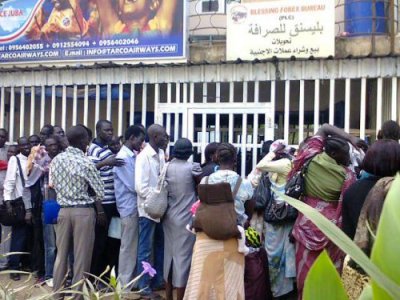S. Sudanese students hit by current economic crisis
May 18, 2015 (KAMPALA) – South Sudanese students in neighbouring countries have continued to feel the pinch of the current economic woes as local currencies struggle against the United States dollar($).

Several of the students interviewed by Sudan Tribune said they had failed to secure hard currencies to enable them pay school fees.
The economy of South Sudan has badly been affected by the ongoing conflict in the country, after some oil fields were shut down.
The young nation largely relies on oil revenues to support its annual budget.
Bol Tut, a South Sudanese studying at Uganda’s Laws Development
Centre, says the economic will badly affect their normal education.
“As students in East Africa, we were affected by the crisis. Even if there is local the currency in South Sudan, there is no way my parent can send these money to Uganda,” a visibly-angry Tut said.
“Even South Sudan currency lost values against Uganda shillings. There is no way we can survive in East African schools,” he added.
Last week, South Sudanese officials visited Uganda and Kenya to seek financial advice on how the nation’s economy can be uplifted.
Buay Keake Turoal, a student at Uganda Christianity University, said it was hard to rescue South Sudan economic problems, which he claimed had been marred by corruption practices in the country.
“The system that is there is to loot any resources. In one and half years, the huge reserves from oil money have been squandered by politicians and policy makers in the country,” said Turoal.
“So where on earth would you think any intervention in term of monetary term will result into the betterment of the economic in the country?” he asked, adding money end up in individuals’ pockets.
“And at the end of the day, nothing will happen,” stressed Turoal.
Lodiong Morris, a student Law at Makerere University, says the economic crisis in the country has already affected some students, accusing officials for embezzling the bulk of the public funds.
But most students are optimistic a peace deal between South Sudan’s warring factions will restore the economy back to normal.
Some analysts, however, argue that the current economic crisis may have more impact on the quest for peace than the mediation or the targeted sanctions to be imposed on both government and rebels.
(ST)
